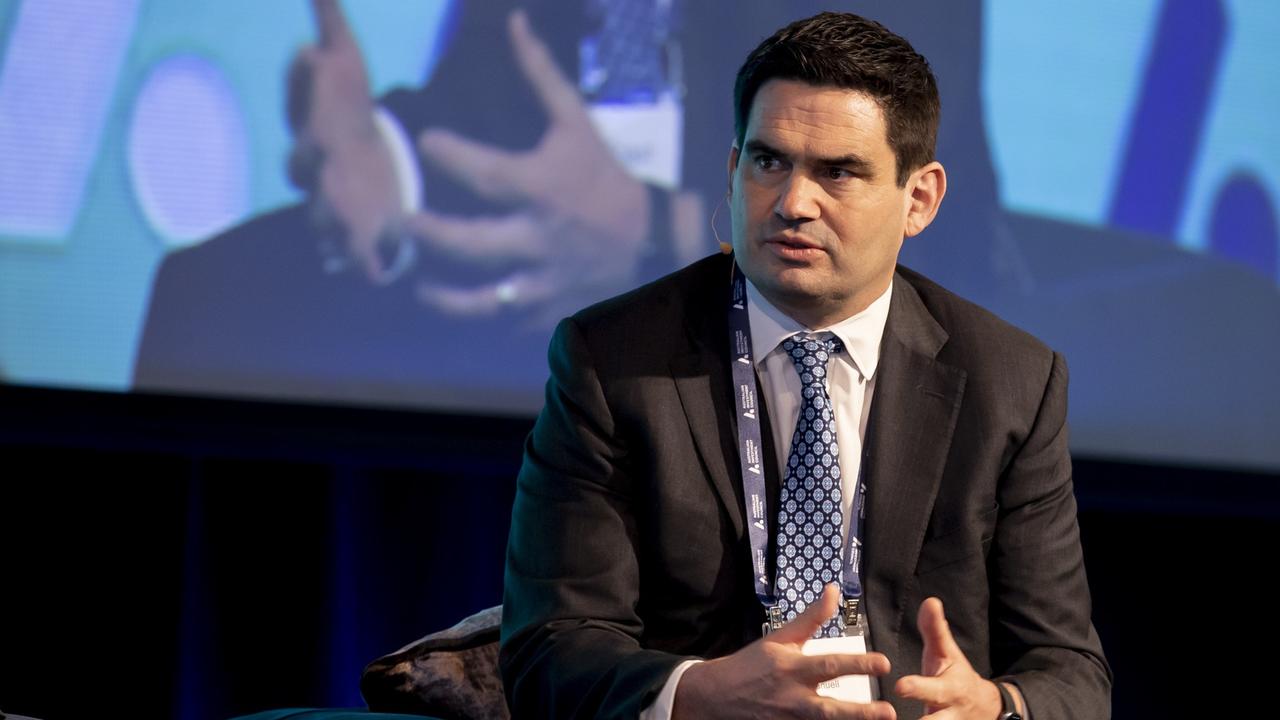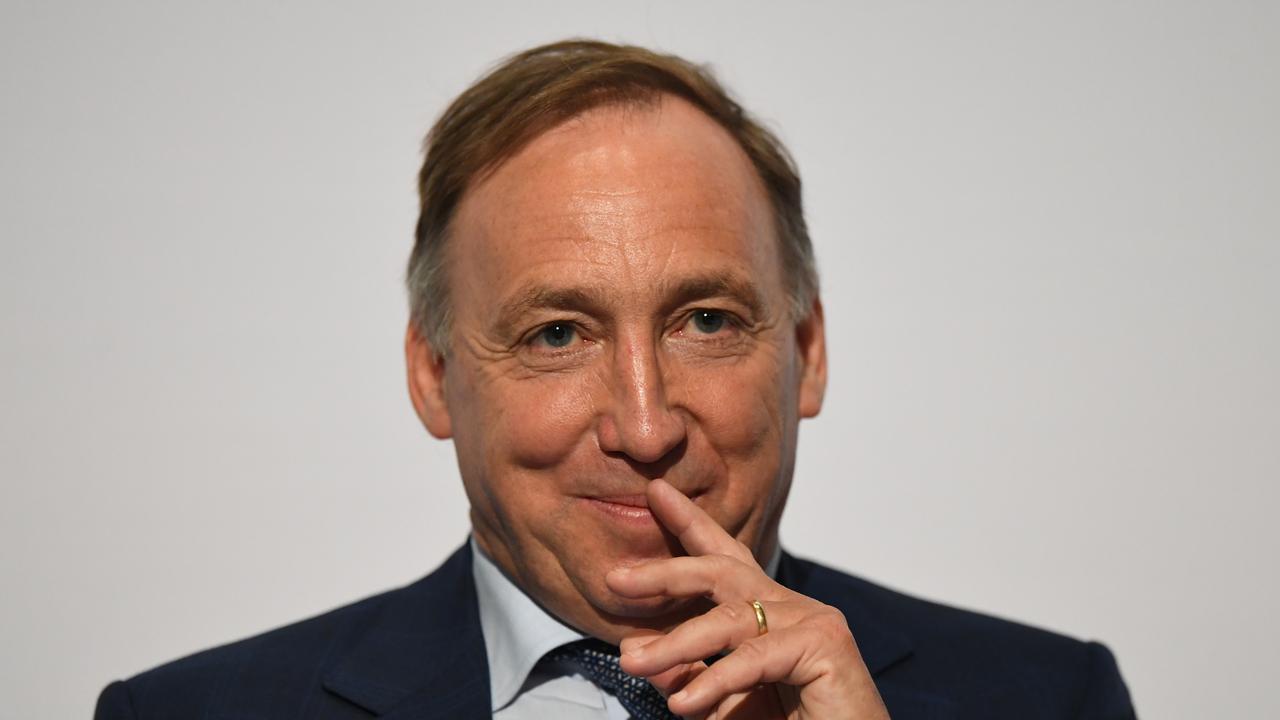Strategic shift: AustralianSuper’s evolution from passive player to kingmaker
Behind AustralianSuper’s aggressive positioning in the $20bn bid for Origin Energy is a change of strategy from a passive investor to an active player in the Australian sharemarket.

Business
Don't miss out on the headlines from Business. Followed categories will be added to My News.
Behind AustralianSuper’s aggressive stance in the hotly contested $20bn bid for Origin Energy is a change in strategy that has been several years in the making – from a passive investor to an active player in the Australian sharemarket.
The strategy dates back to the appointment of veteran investor Shaun Manuell as head of Australian equities at AustralianSuper in September 2020.
At the time Manuell, who joined AustralianSuper as a portfolio manager in 2013 from his role as chief investment officer with Equity Trustees, and AustralianSuper’s long-time chief investment officer, Mark Delaney, agreed it was time for the fund to become a bigger player in companies it saw as having attractive long-term investment prospects.
As the largest active investor in the Australian sharemarket, it decided to take a more influential role in the future of these businesses, taking larger stakes in a few companies with a focus on quality and long term investment potential.
Some say it was an evolution, rather than a revolution, given the increasing size of the super giant, which now takes in a net $2bn in cash a year and manages assets of some $300bn and has been managing an increasing amount of its assets in-house.
Last December, Manuell was made a more powerful player within the fund, in a restructuring which saw the administration of its equity portfolios split into Australian and international shares, with Manuell reporting directly to Delaney rather than going through the head of equities.
From December, the fund’s Australian equities team became a stand-alone outfit, “reflecting the unique characteristics of this market and the size of the portfolio and internal management capability”, as it said in the announcement.
The Australian equities team, it said, now actively managed $57bn of the fund’s $65bn worth of Australian shares.
Fast-forward to November this year and it is Manuell, working closely with Delaney, who is running the fund’s hard-line approach to the bid for Origin Energy – insisting, with a firmness that has surprised many players, that the energy company’s shares are worth considerably more than what is on offer from the Brookfield-EIG consortium. Shareholders will vote on the deal on Thursday.
Some outsiders insist that there has been a change of heart within AustralianSuper, which sat quietly on the sidelines as the Brookfield consortium made its initial approaches late last year, despite having a 12.7 per cent shareholding in Origin at the time. They argue that the fund appeared to be happy with the bid last year but is now taking a tougher line.
But in reality, the fund was keeping its powder dry while the bid played out, finally coming out with its view that the offer was not nearly enough after the Australian Competition and Consumer Commission (ACCC) announced in early October it would not stand in the way of the deal.
But the market itself has also changed since the start of the bid.
As time has gone by, the price of energy companies has firmed, with shares in AGL rising from a low of $5.21 in October last year to $10.24 this week.
AustralianSuper is insisting its view of the bid is a simple matter of valuation – that it believes Origin’s shares are worth a lot more than shareholders are being offered and it is prepared to play a long game as an investor.
“AustralianSuper is a long-term investor in the Australian economy, with more than $150bn invested in Australia,” it told The Australian on Tuesday.
The fund’s stance has put some shorter-term investors offside, concerned that it could scuttle the bid and send the share price back down again.
They argue that its stance will see small shareholders who may want to take the money on offer – or believe the share price will fall if the Brookfield consortium goes away – suffer while the super fund giant has the luxury of having plenty of cash on hand.

One of its biggest challenges is finding solid opportunities to invest its net $20bn cash inflow.
The other element at play is AustralianSuper’s public position that it wants to be part of the energy transition both in Australia and overseas and is prepared to invest in it.
While Brookfield has said it is prepared to invest some $20bn to $30bn over the next 10 years in boosting Origin’s renewable energy portfolio, AustralianSuper also has its own money to put into renewable energy projects.
As AustralianSuper told The Australian: “The fund is open to providing capital to assist Origin as it prepares to transition over the coming decades, while delivering on our net zero commitment and our purpose to help members achieve their best financial position in retirement.”
“The fund will be voting against the takeover scheme from the Brookfield and EIG-backed consortium as AustralianSuper believes the ongoing energy transition has further enhanced the value of strategic energy transition platforms, such as Origin,” it says.
“We also believe that whether in public or private ownership, Origin is well placed to take a leading role in the energy transition.
“As an investor with strong, long-term capital, where it makes sense, we are ready and able to support the company with this.”
As the fund makes clear, the problem with the energy transition in Australia is not the shortage of cash, but the shortage of good-quality projects to invest in.
“We remain committed to exploring any transition opportunities, including with Origin, that are aligned to the best financial interests of members,” the spokesman says.
This week’s vote is the first time that AustralianSuper will become a clear kingmaker in an Australian takeover play. It has been prepared to increase its stake in recent weeks to increase its chances of scuttling the deal.
It now has just over 17 per cent of Origin, putting it within striking distance of the 25 per cent needed to block the bid at Thursday’s vote.
The fund has also been scathing about the valuation of Origin released by Grant Samuel, which puts its worth within range of the offer price.
Manuell and his team made their own internal valuation of Origin, turning to consultants Frontier Advisors, a consulting firm owned by four major super funds – AustralianSuper, Cbus, HESTA and FIRST Super – for confirmation of their view that the true valuation is well over $10 a share.
Some observers note that as a major investor in Australian shares, AustralianSuper has a vested interest in having good quality companies continue to be listed on the ASX.
There are concerns that too many listed companies are being taken private, including Sydney Airport last year and Blackmores this year, reducing opportunities for smaller shareholders.
The Australian Shareholders’ Association is not making any recommendation to its members about whether to accept the bid for Origin.
“All shareholders need to read the documents and give a directed vote that takes into account their personal circumstances,” it says.
But chief executive Rachel Waterhouse told The Australian on Tuesday that she is getting feedback that shareholders are concerned about big names disappearing from the ASX.
AustralianSuper’s stance on Origin will certainly mean that companies and would-be bidders will sit up and take more notice of its potential role on the registers of major Australian companies.
The fund’s stance has also raised questions about whether it has a long-term goal of teaming up with other potential investors – maybe even Brookfield itself — to make its own bid for Origin.
If history is a guide, it would prefer to be the investor coming in alongside a more active partner.
The fund’s history of involvement with takeover bids on the Australian market goes back to 2018 when it joined private equity firm BGH to launch a successful $2.3bn bid to take the ASX-listed education company Navitas private. Months later, it teamed up with BGH again to make a bid for Healthscope, but later backed a higher offer from Brookfield.
Originally published as Strategic shift: AustralianSuper’s evolution from passive player to kingmaker







